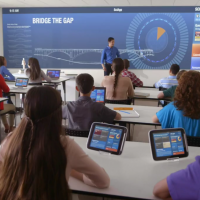What is the purpose of education? To prepare children for an independent life in the world of tomorrow. But what are educational decision makers to do when the world evolves so rapidly that even the most esteemed scientists and visionaries can only shrug when asked what the future will be like?
Computer programming, that’s the buzzword of the day. Every child supposedly has to learn how to program. Steve Jobs and other engaging entrepreneurs have – inadvertently – captivated our outlook on education: all we need is an iPad and programming classes and there you go, we’re all modern again. But what problem does that really solve?
Admittedly, there is a big programmer shortage. But a programmer has to be able to do more than just programming, and there is a great demand for all sorts of other IT skills as well. Studies by LinkedIn have shown that it’s actually not programming, but statistical analysis and data mining that vacancies currently show the greatest demand for. And if we look at the news, we see that the major issues today are not programming but security, threatened by so many crackers, and privacy, infringed upon by eavesdropping governments.
And will that world of tomorrow still even need all those programmers? We now have intelligent software that is itself able to program, without any human involvement. What are all those programmers going to do when that time comes? Just teaching children programming is not going to be enough.
As for those tablets: how come Steve Jobs didn’t raise his children with them? Where is the scientific evidence that a tablet does a better job preparing children for the world of the future than a book, a pen and paper do?
There’s a number of things we can be sure about. 1: The educational system is changing slowly in a world that’s changing and becoming more complex rapidly. 2: The educational system has always been slow to adapt, but it still got us to where we are now. 3: Technology will play a major role in the world we are preparing pupils for, and it should get a prominent place in their education. But are programming courses and playing games on a tablet all day going to be the solution?
Future generations will need to reinvent themselves ever more often and quicker in that rapidly changing world, more so than any generation before them. What we need is self-learning kids, knowledgeable about the real world, the physical world – which is where the challenges and problems of the future will inevitably continue to come from – and with a healthy dose of curiosity about and experience with technology, all kinds of technology.
We need more innovative teachers who are allowed to be innovative, who understand new technologies, who are given the kind of budget they need to integrate that technology into their classes, and who are also paid to share their innovations with other teachers.
Teaching methods shouldn’t be changed once every so many years any more, but constantly, continuously.
And we shouldn’t have either an interactive whiteboard or an old-fashioned blackboard in the classroom; we should have both. Half of the school should be analogue — relying on books, and no phones or computers allowed — and the other half of the school week should be spent on the digital world. With the latest 3D printing technology, tablets, drones, et cetera.
We shouldn’t have just programming courses on tablets, but real education: two days a week for playing outside, two days a week spent on old-fashioned studying – just analogue theory – and one day a week spent working with the latest technology. We don’t need programmers who can’t do a thing, what we need is autodidactic talents who can recognise real problems and find solutions for them, whether those are digital or analogue.
I wrote this column following a request from Radio 1, De Nieuws BV. The Dutch version was read aloud on the radio.

Leave a Reply